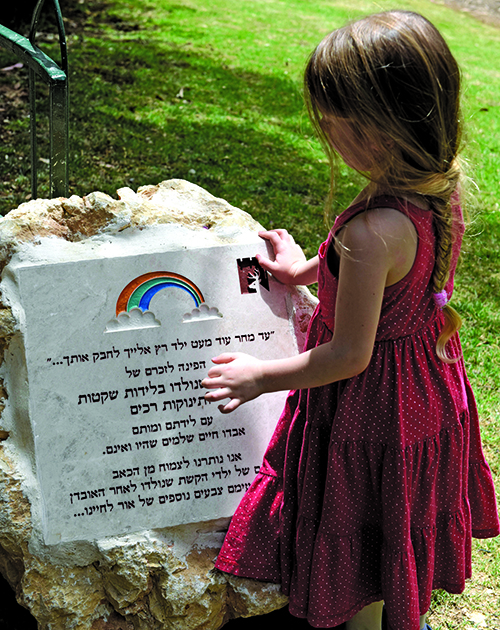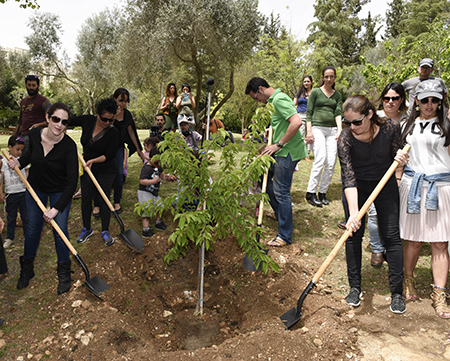Health + Medicine
Feature
Mourning Infant Loss in the Garden of Memory

Schoolchildren race through the grounds of Jerusalem’s Tisch Family Zoological Garden in the mornings, and chattering families stroll its pathways in the afternoons. Interspersed among the cheerful, boisterous crowds, however, a number of couples—some with children, some without—quietly walk the few minutes from the entrance to a small garden set back from the zoo’s main path. Here, two shaded benches face a sapling that promises year-round cherry blossoms, a spring trickles down a large boulder and Himalayan red pandas with lush rust-colored tails and foxlike faces frolic in a nearby enclosure. An engraved stone near the benches reads, in Hebrew: “To our babies who were stillborn and our infants gone too soon. Between your birth and death, an entire life was lost. We are left behind to grow from the pain.”
Dedicated in April 2016, the memorial garden was born in a support group for bereaved mothers run by Malka Nukrian, a midwife on the labor and delivery ward in the Department for High-Risk Pregnancies at the Hadassah–Hebrew University Medical Center at Ein Kerem.
“For me, this garden is about my struggle to balance acceptance that life goes on with the memory of my lost baby and the pain of losing her,” says Sarit Galanti Wiezel, a support-group member who lost a child two years ago. The baby had a congenital diaphragmatic hernia; Wiezel went into premature labor and the baby died. “For a long time I felt: How can I grow and carry on when my little girl is dead? But this garden shows you can do both together.”
Pregnancy loss and infant death have only recently been recognized as full-blown psychological trauma, according to Nukrian, who was the driving force behind the garden. She is also among the researchers instrumental in giving pregnancy loss this vital recognition in Israel. With psychologist and trauma expert Danny Horesh of Bar-Ilan University in Ramat Gan, Nukrian found that up to a third of Israeli women who suffer perinatal infant loss develop posttraumatic stress disorder—the same proportion as victims of abuse, rape and terror. (According to the World Health Organization, the perinatal period of a pregnancy lasts from week 22 until seven days after birth.) Clinical depression is common and divorce rates are high after late miscarriage and stillbirth. At best, couples who face such a loss struggle to adjust and cope.
Over the past decade, Nukrian and fellow Hadassah midwife Eti Yona have led some 70 support groups for women who have experienced perinatal and early infant loss. “These are women and families who have no mourning ritual for their lost babies,” says Yona. “No shiva, often no burial, no identified grave. No one ever knew their baby.”
The idea of a memorial garden began with support group members Wiezel and Hila Cohen-Eiss. “We were looking for a way to be whole,” says Wiezel, “a place where our lost babies are with us, along with our other children, born before and after.”
Some 80 women and their husbands, parents and children attended the garden’s dedication, which, Nukrian notes, occurred on the first day of the Hebrew month of Nisan, “the month of miracles.” The participants planted the cherry tree. Women sang songs and recited poems they had written, and spoke from their hearts. “The emptiness in your arms never goes away,” Cohen-Eiss, whose child was stillborn, told the gathering. “The journey is harder because no one recognizes this. Today, for the first time since I lost my fourth child, Yonatan, I feel able to say I’m a mother of four.”
“A place to go is a gift,” says Hagit Shay, who faced the agonizing decision of a late termination of her severely malformed fetus. “We gave our baby to science. He has no grave. This is where we come to remember him.”
At the dedication, parents placed leaves—wrought in metal and inscribed with the names of their children who never had a chance to live—in a decorated letterbox in the garden’s center. “My baby was nowhere. She has no gravestone,” says Wiezel. “Now the leaf with her name is in the box. She has a place.”
Nukrian did not set out to pioneer support for women and families dealing with perinatal loss. She began her nursing career on a Hadassah gynecology ward and went on to to qualify as a midwife. The mother of three children, she herself suffered five miscarriages. It was, however, a 2003 car accident that proved the trigger for her support efforts.
“I broke both legs and spent a long time in rehab in Hadassah–Mount Scopus,” she says. “I became close to the other patients. Some spoke readily about what had brought them there and how they felt. Others were more reticent. When they finally opened up, it was often to me. That time in rehab taught me that people can get past pain, and I can help them do it.”
In 2006, Nukrian started Hadassah’s first support group for women who miscarried late in pregnancy or had stillborn babies. According to the Neonatal Research Institute, part of the United States National Institutes of Health, in the Western world about one in every 200 babies dies in utero during the second half of pregnancy, compared with one in four who dies during the first 20 weeks. Mothers of babies who die during the perinatal period actively participate in their births, enduring labor and delivery.

“I remember as a young midwife that, when women came to deliver stillborn babies, we midwives would look at one another, each willing someone else to attend her,” says Nukrian. “I’m not comparing it with the mother’s experience, but it’s hard for the medical team, too. Today, we’re organized and supported. The entire delivery team delivers a metaphorical hug to the couple. We know and understand more, so we function better and give better help.”
Nukrian has thrown herself full time into helping women through pregnancy loss and infant death. “My dream,” she says, “is a center that includes counseling, yoga—treatment for the soul—for fathers, siblings and grandparents, too.”
Each of Nukrian’s support groups comprises five to nine women of varying ages and backgrounds. In six sessions, held at the Jerusalem Botanical Gardens, Nukrian and her team lead the women through the cycle of mourning, helping them legitimize their anger, grief and guilt as well as giving them tools to help their partners. Outside the group, “everyone told me I was taking things too hard, I must move on,” says Wiezel. “How can you take the death of your baby too hard? The group was the first place to validate what I felt.”
“We began by combining proven group therapy techniques with our instincts,” says Nukrian. “But as we saw the same issues recur—guilt, shame, anxiety, isolation—we began formal research. We clearly had a lot to learn from these women. Our first study focused on who is at risk for clinical depression and PTSD and how to help them.”
The message the groups transmit is that life continues, women are not to blame for their loss and trauma can be integrated into productive lives. “We weep together, but show these feelings must not rule,” says Nukrian. “We use music. The women paint, producing unexpectedly colorful pictures that we make into postcards for them. Some are more verbal than others, and we help those who have difficulty expressing their hopes and feelings.”
The first groups met at the biblical zoo, which for one year was able to offer a room to the women free of charge. After that room became unavailable, the meetings relocated to the Jerusalem Botanical Gardens, which, says Nukrian, “is close to nature, a beautiful, calming place in which to heal.
“None of the women wanted it to be at the hospital, the scene of their loss, so I looked for another place—one that wouldn’t charge, as I had no budget,” she adds.
Though they explored a half-dozen possible sites for the memorial garden, Nukrian and the women she counseled never forgot the unique comfort they experienced meeting at the zoo. “We made our choice as soon as we saw it,” says Nukrian. “The area is shaded, beautiful and has space to picnic and play.” The women in the support groups raised funds for the garden and the garden itself will be maintained through donations.
Although parents visit the garden on their own, a group meeting is scheduled there for October 15—International Pregnancy Loss Remembrance Day—which they plan to make into an annual event.
“Because my baby died, I discovered this world of grief and helped build this garden,” says Wiezel. “Knowing that the death of my daughter has helped others, helps me. I still cry for her, but I carry on. And the garden gives me peace.”
Wendy Elliman is a British-born science writer who has lived in Israel for more than four decades.










 Facebook
Facebook Instagram
Instagram Twitter
Twitter
Alexandra Konigsburg says
While this is a wonderful stride forward towards recognizing and supporting pregnancy loss, there seems to be a very specific effort to separate loss after 20 weeks from that before 20 weeks, as if that line somehow demarcates one of those as worth acknowledging.
While loss before 20 weeks is more common than after, that hardly makes it less painful. The death of a parent or both parents is even more common than either but would someone walk into a shiva house and say, “Eh, it’s not so bad. Most people’s parents die before them.” No. Frequency might provide more outlets for support (although I have not found that to be the case around miscarriage) but it does not make it easier to bear.
Debbie Slevin says
I read this article with particular interest, having delivered a stillborn baby myself 33 years ago. Her memory is not forgotten nor marginalized. I would like toys support this project. Any suggestions how to contact them?
Leah Stolar says
The article says “The women in the support groups raised funds for the garden and the garden itself will be maintained through donations.” but there’s no information about how to make a donation.
sara says
Are there any support groups for English speaking women who lost a baby in Israel?
Ziva Glanz says
Sara, I also sugfered infant loss and we have amazing online support groups for English speakers, both on facebook and whatsapp. You can find me on facebook (Ziva Glanz) and I can direct you. We are also trying to raise the funds now to put up a website that will serve as a central jewish bereavement website for English speakers and connect even more people.